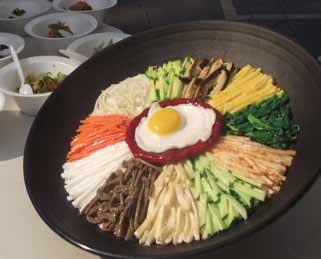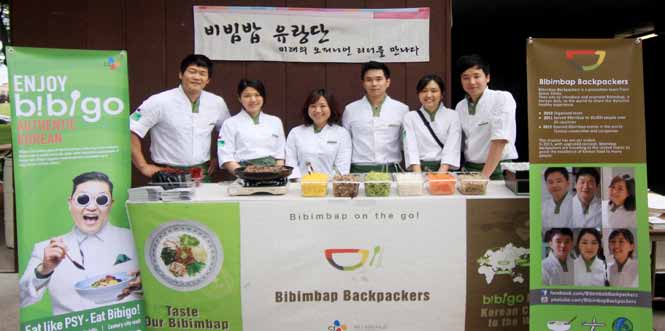 | ▲Bibimbap Backpackers served bibimbap at the 2013 LA Street
Food Fest at the Rose Bowl on June 29 ⓒ2013 heraldk.com |
| |
KH: Last year, Bibimbap Backpackers went to school campuses to introduce bibimbap. Did you go to schools this year as well?
BB: Yes, it was the same year. We started from New York then proceeded to go to Boston, Chicago, Los Angeles, and then San Francisco. When we were in the East Coast, we visited MBA business schools and the rest were from memory of last year. The schools we went to in Silicon Valley were mostly from memory. Right now we are trying to get in contact with people from Los Angeles and Irvine. We are currently trying to get to Irvine because of a food festival there and trying to get into Los Angeles because of the vast entertainment industry. There is actually an event that we are trying to get involved with on Friday, July 9.
KH: What is the nature of the event that BB will be trying to participate in on July 9?
BB: We have currently invited around 30 food bloggers who are interested in our type of cultural cuisine. If the first step we took was to personally cook bibimbap and tell our customers first-hand about it, then the second step would be to put it up on the Internet for viewers to read about the experience. And although our articles could well-inform readers, we are aiming for an article from a different perspective by American bloggers for the American public on this new Korean dish that they have tried for the first time. We tried this method in New York with the bloggers there and we saw increased interest from more Americans.
KH: We heard that the recipe for bibimbap changed last year. Was it changed again for this year?
BB: Instead of only bibimbap this year, we introduced a whole course to the people we’ve been meeting. We added in Korean appetizers, such as Korean pancakes, sweet potato noodles, and dumplings, with bibimbap as the main dish, and finally, another type of pancake, Hotteok, which is traditionally a dessert that’s baked with cinnamon and peanut filling. We also changed our bibimbap to adjust to the different tastes of people from throughout the world. For example, we plan to use fresh-cut vegetables and garlic chips to add in a crispy texture and also add in additional toppings such as corn and tomatoes.
KH: So are you trying to create a fusion of American and Korean tastes which can cater to a wide palate?
BB: Yes, both fusion and Korean cuisine are doing really well. But the fusion of taste is not the only concept we are thinking of for our group. We believe that the atmosphere of the area must also cater to not only Koreans but also Americans as well. For example, if you were a foreigner in an extremely popular restaurant that didn’t speak your language, it would be a major turn-off no matter how good the food is reported to be. When we say fusion, we want the restaurant to have fusion of foods as well as fusion of cultures where everyone can join and eat without difficulties.
KH: What were some of the hardships that BB went through this year?
BB: Well, there were a lot of difficult things for us. The most prominent worry would be the lack
of attention on BB. For example, even if we were to serve 10,000 people in LA, the total population of LA is far greater than just 10,000. Our goal is to leave a lasting impression on our customers so that they may remember our style and food. By doing so, our eaters will eventually start to spread our name around through word of mouth.
KH: Out of all the places that BB has been, where was the most positive reaction that BB has received?
BB: In Toronto, we met with nine famous chefs who worked at famous restaurants and hotels. They took a lot of interest in the Korean condiments that we used such as red pepper sauce and Korean soybean paste. They asked where to find the ingredients to create the sauces so that they themselves could try to make it themselves. What we hope to see from that is for Korean sauces to be incorporated into the various dishes by the chefs. Koreans chefs cannot go outside of their box to try out something new because of their mindset of sticking with traditions whereas American chefs aren’t afraid to try out new recipes.
KH: What are some future plans or destinations for BB?
BB: As of now, we have events planned out for Microsoft, Nokia, Dreamworks, Facebook, Intel, and hopefully Google. Basically, a lot of bigger name American companies where we hope to only to serve bibimbap but to spread Korean culture to
the eaters as well. We are trying to create a chain reaction which starts from our bibimbap. If they think it’s good, they might go out and consider other Korean foods they haven’t tried yet and continue to expand awareness of Korean culture from there.
| 


